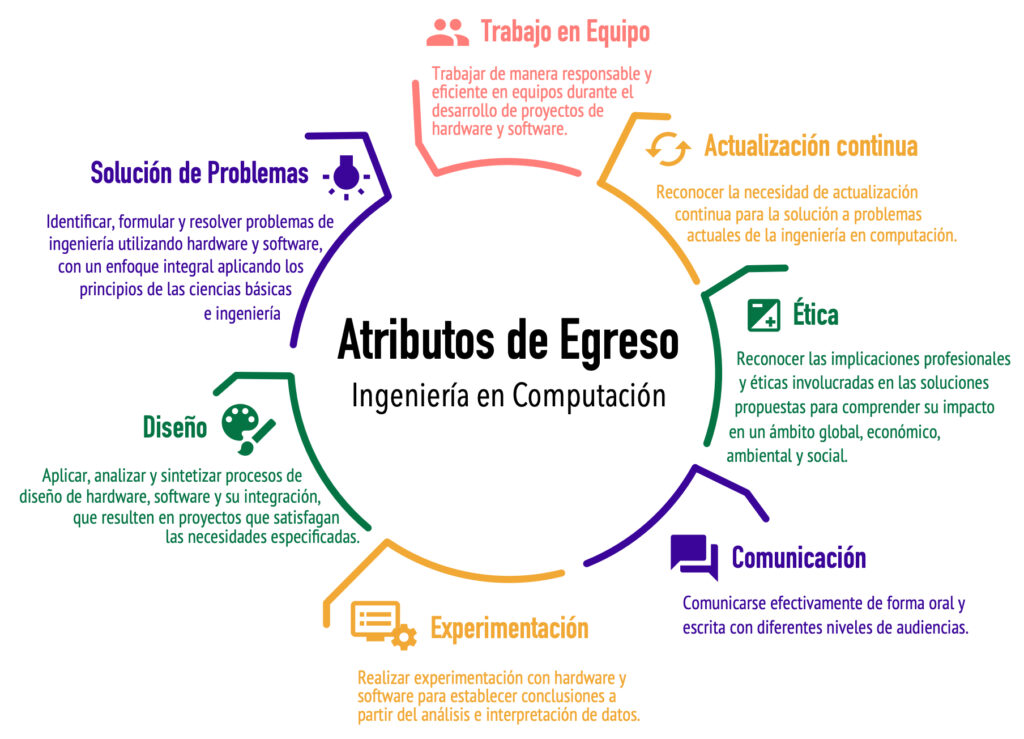ADMISSION PROFILE
Applicants seeking admission to the Computer Engineering Program must possess the following knowledge, skills, attitudes, and values:
- Knowledge:
- Algebra
- Trigonometry
- Analytic Geometry
- Physics
- Chemistry
- Computing
- Skills:
- Effective communication
- Teamwork
- Planning, execution, monitoring, and control of task
- Identification and resolution of engineering problems
- Self-learning and sensitivity to the need for continuous updating
- Interpretation of information and drawing conclusions
- Critical and analytical thinking
- Creativity and innovation
- Attitudes:
- Willingness to work in interdisciplinary teams
- Discipline and organization in work
- Openness to change
- Entrepeneurial mindset
- Proactivity
- Values:
- Trust
- Creativity
- Honesty
- Humility
- Justice
- Loyalty
- Freedom
- Perseverance
Respect - Responsibility
- Solidarity
- Tolerance
GRADUATE PROFILE
Graduates of the Computer Engineering Program are professionals committed to their environment, open to change, creative, and in constant pursuit of knowledge and innovation. They are capable of working independently or collaboratively in multidisciplinary teams, specializing in the study, diagnosis, evaluation, and management of computer systems. They are trained to solve problems through the analysis, design, proposal, development, and implementation of computational technologies that meet specific needs and contribute to sustainable development in both national and international contexts.
The Computer Engineer will be compotent to:
- Develop computing applications that integrate hardware and software in innovative ways, based on the identification of process needs, in order to meet the requirements of society and organizations in a global context, with order, respect, and creativity.
- Select and integrate computer systems and their interconnection, applying current methodologies for design, installation, configuration, and management, with the goal of achieving optimal processes and efficient use of resources, in a responsible and honest manner.
- Develop software and firmware systems, following industry methodologies and standards to address real-world problems, ensuring the quality of the solution, with creativity, teamwork, and effective communication.
- Manage computer systems projects, ensuring success through the efficient use of resources and the application of management tools and techniques, with responsability, honesty, and an entrepreneurial mindset.
GRADUATE ATTRIBUTES

- Identify, formulate, and solve engineering problems using hardware and software, with a comprehensive approach applying the principles of basic sciences and enginieering.
- Apply, analyze, and synthesize hardware and software design processes and their integration, resulting in projects that meet specifies needs.
- Conduct experimentation with hardware and software to draw conclusions based on data analysis and interpretation.
- Communicate effectively, both orally and in writing, with diverse audiences at different levels.
- Recognize the professional and ethical implications involved in proposed solutions in order to understand their impact in global, economic, environmental, and social contexts.
- Acknowledge the need for continuos learning and updating to address current problems in computer engineering.
- Work responsibly and efficiently in teams during the development of hardware and software projects.
EDUCATIONAL OBJECTIVES
- Solve contemporary problems that require the analysis, design, integration, implementation, and evaluation of computer systems.
- Remain up to date with cutting-edge technologies and disciplinary knowledge that enhance their professional competencies.
- Perform with values in professional environments at a global level, communicating effectively, both orally and in writing, with multidisciplinary and multicultural groups.
- Assume roles of greater professional responsibility in the field of Information and Communication Technologies (ICT).
PROFESSIONAL FIELD
The Computer Engineer may work in companies and institutions at the state, national, and international levels where computer systems are managed from the perspective of hardware, software, and their interconnection:
- Public Sector:
- Government agencias
- Communications and transportation
- Educational and research instutions
- Research centers
- Private Sector:
- Companies and small businesses
- Maquiladora industry
- Research centers
- Intependent Professional Practice:
- Advising, designing, implementing, documenting, and evaluating projects in automation, computer networks, and/or software engineering
- Designing, selecting, and installing computer systems equipment and software
- Maintaining computer systems in optimal condition
- Innovating and generating computing technologies
- Marketing and promoting the use of computer systems
- Designing and delivering training programs
Para más información:
Responsable del Programa Educativo Ingeniero en Computación:
Dr Mauricio A. Sánchez
✉ Coordinación Ingeniero en Computación
Facultad de Ciencias Químicas e Ingeniería. UABC. Campus Otay: Calzada Universidad 14418 Parque Industrial Internacional Tijuana B.C. 22427 Tel.979 75 00.
